#roman women
Text

Museo Barracco, Rome
Rome, July 2015
#Roman women#Greek women#hairstyle#eye#ancient#art#Greek#Roman#portrait#head#Rome#Museo Barracco#my photo
37 notes
·
View notes
Text
How have I gone all this time with no one telling me about the Italian slave girl who became the first queen regnant of Parthia, poisoned her former owner/husband, survived being overthrown and comfortably retired in Rome?

Her name is Musa and I need a movie about her now.
174 notes
·
View notes
Photo
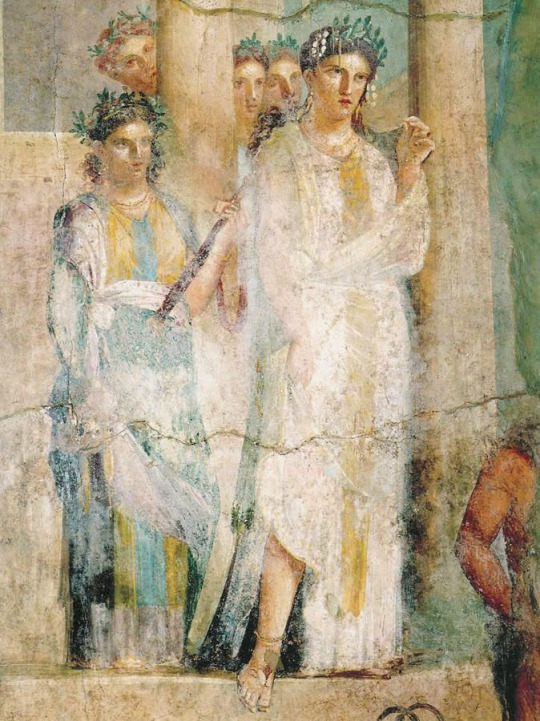
Aristocratic Roman women, from a mural at Pompeii
#fresco#art#fine art#pompeii#greece#rome#crete#mediterranean#roman women#italy#spain#france#greek#roman#western civilization#Aristocracy#aristocrat#our ancestors
1K notes
·
View notes
Text
Antony and Cytheris
There was a Greek actress named Cytheris who was Antony's mistress during 48-49 BC, and he gave some offence to respectable people by gallantly calling her Volumnia, a name almost sacred to the Romans because it was that of the wife of Coriolanus, the woman who, in 489 B.C., saved Rome from her husband's vengeance.
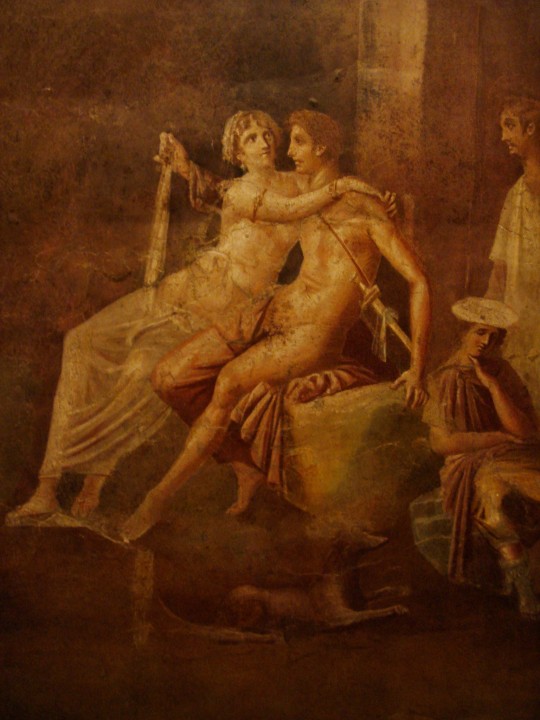
Antony took her about with him on the various political journeys he had to make to towns in the neighbourhood of the capital, and caused a good deal of outraged comment by introducing her to the local notables who received him.
He was, in fact, very proud of being her lover, for the stage and its celebrities thrilled him newly come as he was from the camp as greatly as it thrilled men ten years younger than himself who lived in Rome; and his was not the nature to conceal his feelings.
It has often been said that Antony never grew up, but remained, as Renan puts it, "a colossal child, capable of conquering a world, in capable of resisting a pleasure"; yet at this period of his life, at any rate, that criticism does not quite meet the case: his boyish attitude towards Rome's gaieties was due, rather, to his having been out of reach of them during the years in which young men were generally having their fill of them and becoming blase.
When he had thus to go out of Rome, he used to take his mother with him, assigning her a carriage or litter and its escort not any more splendid, as Plutarch tells us, than that given to Cytheris, a circumstance which led Cicero in after years to pretend that the elder lady, utterly neglected, was forced to follow the mistress of her profligate son as though the hussy had been her daughter-in-law.
But the fact that he did take his mother about with him suggests, on the contrary, that he was a very affectionate son whose goings-on were indulgently smiled at by the broad-minded Julia, accustomed as she had been all her life to the lax morals of the fashionable world. It is conceivable that she was very fond of Cytheris.
Sources: Plutarch’s Life of Antony
Cicero, Philippic ii, xxiv.
Arthur Weigall, The Life and Times of Marc Antony
#marc antony#mark antony#marcus antonius#cytheris#rome#roman history#ancient rome#roman republic#roman empire#plutarch#women of rome#roman women
41 notes
·
View notes
Text
Thinking about the women who weren’t aristocratic, whose lives we never hear about in the histories, and only with snide humour in the satirists.
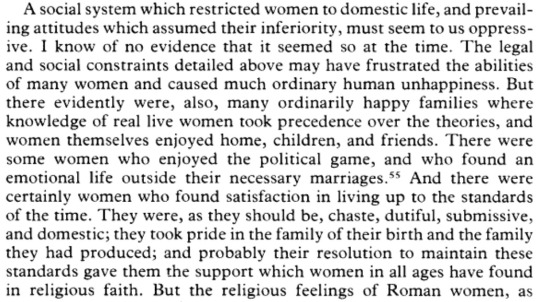
*

From the article, Roman Women by Gillian Clark.
[Greece & Rome, Vol. 28, No. 2, Jubilee Year (Oct., 1981), pp. 193-212 (20 pages), on Jstor.]
78 notes
·
View notes
Text
Sulpicia was a Gleek
2 notes
·
View notes
Text
The Julio-Claudia’s dynasty naming convention:
Men: Caius, Marcus, Gaius, Britannicus, and Tiberius.
Women: Agrippina. Only Agrippina.
#roman history#julius caesar#roman empire#Roman women#seriously there were three Agrippinas at one time. it was super confusing
2 notes
·
View notes
Text
Bust of Livia <3

#livia#augustus#ancient rome#imperial image#emperor augustus#roman women#classics#classical civilisation#british museum
11 notes
·
View notes
Text
"Is that so?" said Quartilla, "Is she younger than I was when I took on my first man? May I receive the ire of Juno if ever I remember that I was a virgin. For even as a young child I was stained with those of my own age, and soon after I applied myself to older boys until I came of age. I think this is the reason that old saying came into existence: the one who can lift the calf, can lift the bull."
"ita" inquit Quartilla "minor est ista quam ego fui, cum primum virum passa sum? Iunonem meam iratam habeam, si umquam me meminerim virginem fuisse. nam et infans cum paribus inquinata sum, et subinde procedentibus annis maioribus me pueris applicui donec ad [hanc] aetatem perveni. hinc etiam puto proverbium natum illud [ut dicatur] posse taurum tollere, qui vitulum sustulerit."
–– Petronius' Satyrica 25.4-6
Quartilla, the priestess of Priapus, is speaking to Encolpius who is objecting to the "wedding" between his boyfriend, Giton who is sixteen, and Pannychis, a girl who seems no older than seven. Gareth Schmeling (2011) argued that while unusual, marriage to a girl this young was not illegal. That is mistaken. It was illegal for a girl under the age of 10 to become engaged and she had to wait a minimum of two years before she could legally marry, making twelve the most accepted minimum age of marriage for a Roman girl.
#tagamemnon#Petronius#Satyricon#Satyrica#Roman history#Roman literature#Latin literature#Roman women#Roman marriage#ancient marriage#lingua latina
5 notes
·
View notes
Text
I love you people going into "useless" fields I love you classics majors I love you cultural studies majors I love you comparative literature majors I love you film studies majors I love you near eastern religions majors I love you Greek, Latin, and Hebrew majors I love you ethnic studies I love you people going into any and all small field that isn't considered lucrative in our rotting capitalist society please never stop keeping the sacred flame of knowledge for the sake of knowledge and understanding humanity and not merely for the sake of money alive
#classics#mythology#ancient greek mythology#ancient roman mythology#comparative literature#latin#hebrew#ethnic studies#fuck capitalism#communism#i love my useless degree idc#academia#university#dark academia#Greek#philosophy#liberal arts#humanities#women and gender studies#cultural anthropology
36K notes
·
View notes
Text






















I can't believe childhood is over.
SUCCESSION (2018-2023)
#url childhoodtheme devastates herself by weaving together the childhood themes of her current favourite show#who is surprised!#i've had this post cooking for a while and the finale completed it perfectly. sobbing my eyes out#caption is the quote from#little women (2019)#succession#succession spoilers#successionedits#web weaving#parallels#childhood#post#kendall roy#shiv roy#roman roy#connor roy
7K notes
·
View notes
Text
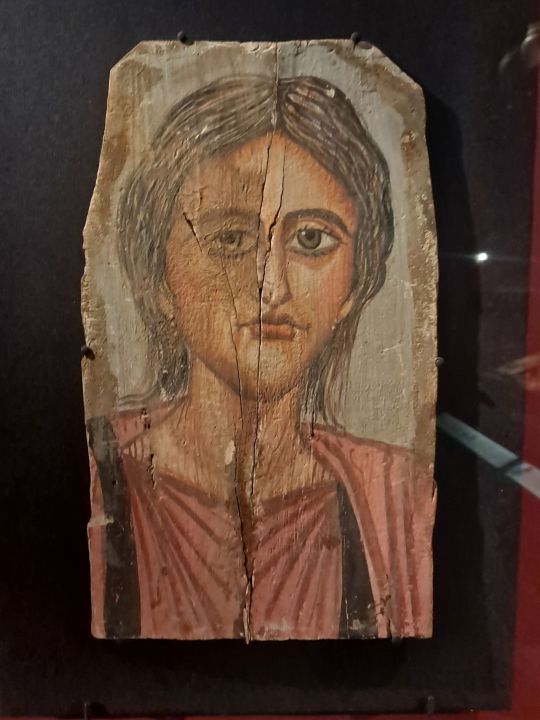
Mummy portrait
* Roman Egypt
* Medelhavsmuseet, Stockholm
Stockholm, November 2023
68 notes
·
View notes
Text
228 notes
·
View notes
Text

#lord jesus christ#inri#jesus christ#faith in jesus#jesus#catholic women#catholique#catholic#roman catholic#catholicism#catholic coquette#christian faith#christan girl#christianity#catholiscism#catholocism#rosary#god#holy spirit#holy trinity
2K notes
·
View notes
Text
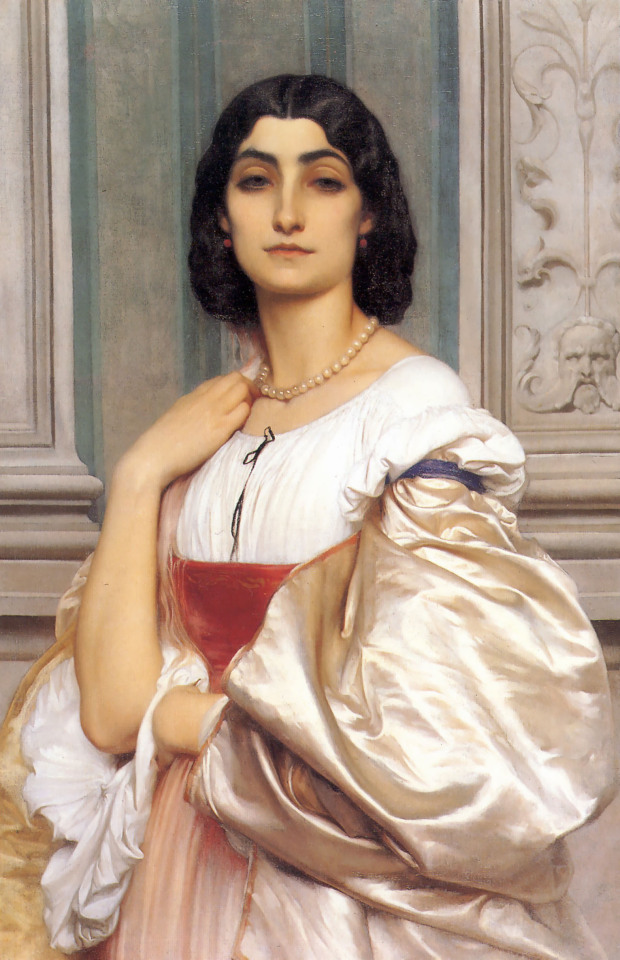
A Roman Lady (1858) by Frederic Leighton
(x)
#frederic leighton#roman#portrait#women in art#academicism#academic art#academic style#1850s#19th century#19th century art#painting#oil painting#oil on canvas#art#💮💮
1K notes
·
View notes
Text
Poor Virginia...
… One can note the numbers, and the sentiments, of one Marcellus in composing the epitaph for his Lady (domina mea) Virginia “through whose good labours my children now flourish, [the woman] from whom I had ten children in eleven years”. Gaius further extols Virginia as a woman “who deserved to live a hundred years”. Since she was pregnant in every one of the eleven years of her marriage, however, one wonders if that sentiment would have been echoed as eagerly by Virginia herself.
[From the journal article 'With Whom I Lived': Measuring Roman Marriage by Brent D. Shaw; Ancient Society, Vol. 32 (2002), pp. 195-242 (48 pages) on Jstor]
11 notes
·
View notes